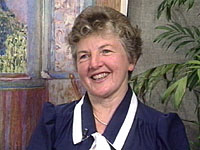
Fran Allen |
I wanted people to know what a great scientist he is, and how he has impacted where computer science is today.
And I wanted to lay out, to the extent that we could with this project, a whole picture of his ideas and his work, and the person.
|
|
Stretch
|
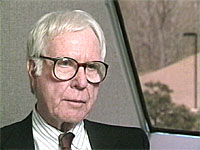
Red Dunwell
|
I had a very excellent way of managing John. It was very simple. I'd ask John what he was going to do, and then I'd agree.
And it worked very well. And he never disappointed himself, and he never disappointed me.
|
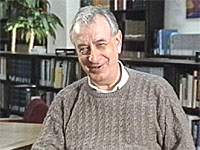
Jack Schwartz |
Most people mature somehow to a kind of age of 13. And exceptionally mature people who go on to become presidents, corporation presidents,
may get up to 15. The typical scientist is around 11. John is somewhere between 9 and 10.
|
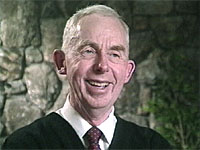
Bradford Dunham |
I looked in my rear view mirror and there was John in his tattered overcoat, because he always wore a very tattered overcoat, riding
the unicycle around in circles on this square. And I thought, who else but John would be seen in the middle of a giant snowstorm,
riding a unicycle on this square, wearing that tattered overcoat and going, "Yip, yip, yip, yip."
|

Red Dunwell
|
Ralph Palmer, who was then head of the Development Laboratory, called about 20 of us and said that we weren't going on vacation that year.
Instead of having - the plant had a regular vacation period that we all went - instead of taking a vacation at that time, we were all going
to get together and decide what we were going to do about the next generation of computers from the hardware standpoint.
|
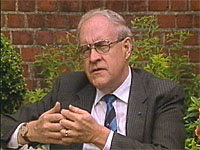
Fred Brooks |
Steve Dunwell raised our sights, and tried to make us see that we were designing a high performance machine for general applicability.
|
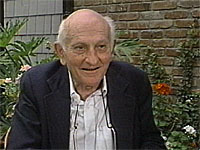
John Cocke |
There were people who were legitimately computer architects like Fred Brooks and Jerry Blough, who actually knew something, right. I was just
there learning.
|
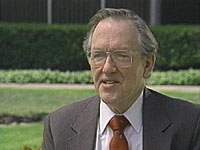
Harwood Kolsky |
Steve asked John to please describe how he saw we could improve the concurrency of operation on the Stretch, and speed it up.
And John started describing this in his usual enthusiasm, and he ended up drawing on all of our napkins timing diagrams, timing charts.
|

Fred Brooks |
The two microsecond core memory that they used in the 7090 was developed for that project, and a way to drive the memory with transistors.
|

Red Dunwell
|
A direct order came down that no one was allowed to be seen with vaccum tube equipment. No one was allowed to have any on a bench.
If you wanted to work on vaccum tube equipment you had to hide it. Literally. Physically. You had to hide it. And that was the way in which
the word was gotten through to everybody that if they couldn't fall back on what they knew about vaccum tubes, if they ran into a problem
with transistors they didn't know how to solve. They had to solve their problem.
|
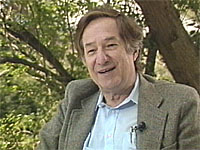
Ed Fredkin
Back in the days when they were doing the Stretch computer, there was a problem that came up, which was that the memory couldn't be made fast
enough to keep up with the hardware.
|
|

John Cocke |
In order to not exceed the Curie Point, the whole thing was kept in oil. And it was a great pain. I mean, if you dragged it out of oil
it dripped, it did this, it did that. And the motion caused the cores to turn and wear out.
|

Red Dunwell
|
Incidentally, it was one of the members of the Stretch project that came up with the word "byte", that's now in the dictionary.
|

Fred Brooks |
In the Stretch project, we had a chance to build a machine for speed, without worrying about cost, and this drove us to
attempt things that no one had ever attempted before.
|
|
.
|
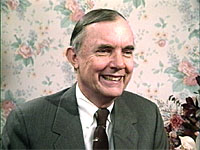
Lewis Branscomb |
John's the only person - one of the very few people I know whose IQ is higher than his blood cholesterol level.
|
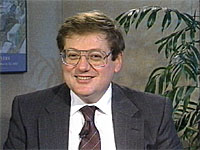
Abe Peled |
I met John [in] 1974 when I first came to interview at IBM. It was pretty interesting. Joel Birnbaum was my host. He was, at the time,
a senior manager in the department, and he was explainig to me the people on the agenda and he said, "Oh, John Cocke. This is the smartest
man in the United States. He didn't look like the smartest man in the United States. But he said, "Well, what are you working on?" I
thought, well, since he's well known for computer architecture, I'm on relatively safe ground. I will tell him about digital signal processing.
And I started describing my thesis, and about five minutes into my description, he went to the board and wrote more or less the essence of
the rest of my thesis. So that was a pretty rude awakening.
|

Bradford Dunham |
If he got interested in a particular topic, it was sort of like a dog grabbing hold of that bone. And you can't shake him from it.
|

Fran Allen |
This is the end. There are no new ideas. We're going to write the manual. We're going to send it to development to build it. We're going
to do something. And you can't... No more ideas here, John.
|

Jack Schwartz |
His scientific style is one in which he keeps circling back to the same question. I think of it sometimes like a dog worrying a bone.
He'll chew away at it for a while, forget about it for awhile, but then always come back to the same bone and chew on it some more.
|

Fran Allen |
And seeing Ed Sussenguth, in his very kind way, pulling John by John's tie out of Ed's office and saying, "No, John. We settled that yesterday."
|
|
ACS
|

John Cocke |
Piori told him he wanted a large machine project, similar to Stretch, and this and that, to what it had been. And so Jack [Bertram] asked me to help
him put such a project together.
|

Jack Schwartz |
He was regarded as the principal thinker by Jack Bertram, who was the manager of the project, and he relied on John to set the key technical
directions, both in hardware and software.
|

Fred Brooks |
The object, at the time, was to build a machine that was a thousand times faster than the then prevalent 7090 class machines, which would have
made it an incredibly powerful computer. As a matter of fact, it would rank up with some of the high speed machines that we have today.
|

John Cocke |
We were a little naive in those days about how to sell projects. We had all kinds of ways of how we would spend our money, and design it in
certain ways so that the cost performance would be highly optimized. And we had various charts about how this was going to be the case. And
we were giving them to Piori and Piori was saying, "No. Watson wants the fastest computer. Forget all this business about trying to make it
cost/performance, and figure out how to make it the fastest scientific computer out."
|
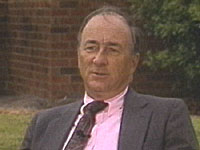
Ed Sussenguth
I've worked with a lot of very talented people in my thirty years in the company. I have never had a group of such talented people all in
one place, as that ACS xx. I think if they asked us to make a pen, we could have made the world's best pen. It was just a great group of people.
|
|

Harwood Kolsky |
The project collapsed mainly because of technology. It was not quite available at the time. But, I think in a greater sense, it wasn't possible
for ACS to take on the entire system line, you know, headon, the way Stretch took on the 704. And have a hope to win.
|
|
.
|
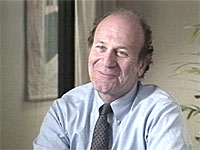
Joel Birnbaum |
John is one of the few people that actually did what you always hear about, which was to try to write on a blackboard with the end of his
cigarette while he put the chalk in his mouth with the other hand.
|
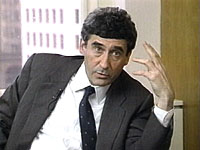
Ralph Gomory |
I was in my office, and the door opened, and John - of course, I didn't know who it was - came in. And he started talking to me about,
I would say, everything. It wasn't about any one thing. And I really didn't know whether I was talking to someone who seemed to know
everything, or whether he was just, you know, crazy.
|

Ed Sussenguth
Talking with John is a unique kind of thing. The typical experience, if I could think of a day, is that you're sitting at your desk, or
whereever it is, doing the thing you're supposed to do, and a couple times a day, or every third day, John walks into your office and starts
writing on the blackboard. Usually you have some idea what it is, most of the time you don't have any idea what he's talking about.
And, sooner or later, you realize that he is doing something that fits into what you're doing, and it's so far ahead of what you're doing,
and you're able to catch up to him. It's not like working with other people.
|
|

Abe Peled |
I remember my neighbor saying, "Well, how can you do any work because you always have John in there writing on your blackboard, and I cannot
concentrate. So I said, "Well, you should start listening. Maybe you'll get some good ideas."
|

Harwood Kolsky |
He would sort of go from one room to another, and from one lab to another, you know, spreading ideas and trailing cigarette ashes as he went along.
|

Joel Birnbaum |
I met John Cocke when I came to IBM for a job interview in 1965. After I'd spoken to a few people, they inserted him onto the schedule.
And at that time John was just getting ready to leave to start for California, with what was to become the ACS project. And for some reason he
decided that I would be a good person to join that project, but he told me that he wasn't allowed to tell me what the project was about,
nor what it would be doing, or what my role would be, but he encouraged me to come because he thought I would find it just right. This seemed
a little vague to me, and I guess he could tell I might not want to move to California based on that information, so he said, "Ah, the hell with
it. I'll show you all this stuff even though I'm not supposed to." And he opened a file cabinet, which turned out to be full of dirty shirts,
which he then proceeded to dump out onto the drawer and rummage about for five minutes. Then said, "Ah, let's forget about all this and let me
have you meet some of the other people in the project. Well, I decided to join Yorktown, but it wasn't until several years later when John and
the others came back that I really got to know John. But I never did quite forget the breaking of the IBM image that I had in my mind up until
meeting John.
|
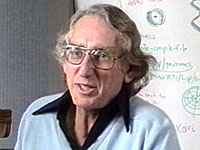
Ian Gunn |
Well, there was a time when everytime you tried to get into John Cocke's office, you were in danger of knocking over a pile of shirt boxes.
They'd start that high, then they were that high, and that high, and that high. And it turned out that the reason there were so many shirt boxes
in John's office was that he liked to wear a clean shirt every day, but he'd never get around to taking them to the laundry. So he'd just
buy a new shirt when he felt he needed one, put the old shirt - usually, I think, he changed at the lab - put the old shirt in the shirt box,
and put it on the top of the pile. Some of us keep papers on the same principle. And you can tell - you can find things by an archeological
method. You know approximately when you last saw it, so you know how far down the pile it must be. Well, I think John's shirts were organized
on the same arrangement. And I think finally, when they got right up to the ceiling, somebody convinced him that he could actually get these
shirts washed and laundried.
|

Joel Birnbaum |
I don't think John ever had an office. It was basically he had a closet, and it had a desk in it, and it was just full of papers,
and clothes, and cigarette butts, and whatever else John happened to have with him. John's office was the halls, and he would just walk around
and drop into people's offices. Usually he was very welcome, I think. Dropped in anyway, whether he was welcome or not.
|
|
801
|

Ralph Gomory |
George Radin popped up in my office, and said that they were going to do - they wanted to run a project to design a CPU. And he kind of outlined
to me a little bit about it. But this is what eventually became the first 801. And I was very cool to this, because he didn't name any numbers.
And I said, "George, what's the use? If you can refine this stuff, and make something that runs twenty percent better, it's not going to
really do us any good." And he said, "It isn't twenty percent." I said, "What is it?" And he said, "Well, it's more like a factor of two or
three." So I said, "Gee, if you can do that, I'm interested."
|

Abe Peled |
John would camp in my office and really say, "Abe, we have to do this." And so on. And it was. It was the right time, and the right set of ideas.
|

Fred Brooks |
John, because of his deep understanding and contribution to optimizing compilers, said the appearance of the optimizing compiler makes it possible for
us to essentially go backwards in computer design, back to the most primitive computers with the Risc concept.
|

Ed Fredkin
And John said, "Remember that PDP-1?"
|
|

Fred Brooks |
John recognized the coming together of optimizing compiler technology, instruction and data caching, and the possibility, then,
to go back to the - to go away from microprogrammed computers, back to essentially use the microprogrammed computers or, really, compiling
directly to microcode as a way of getting maximum computer speed.
|
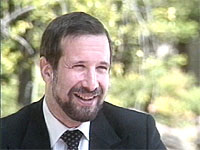
Andrew Heller |
He played godfather to all of the major technical areas in the architecture of the machine and, in a lot of ways, in the tools?? of the machine,
both of which were necessary to drive as far and as hard as we did. John basically had free rein to go in and fix things by convincing people.
And if he couldn't convince them, he'd come down and beat me up and I'd convince them.
|

Ralph Gomory |
I was a part of that all the way through trying to get various parts of IBM to adopt it, which was hard because they were all committed to their
own machine.
|

Lewis Branscomb |
It's the only time, in the 15 years I was at IBM, when the company got its brightest people, and said to them, "Build us the best product that you can, that
you think is the best product you can do." And didn't force it into a lot of compromises. At least, not until it was very far down the path.
And the result really showed. And I hope very much that the IBM management has learned a lesson from that, because if the whole company
had products that were as outstanding as that one is, how good my retirement would be.
|

Ralph Gomory |
I don't really like characterizing John as the person who invented Risc, but that characterization would be enough to make any other
person famous.
|

Andrew Heller |
Most of the modern concepts of compiler technology were concepts that John was responsible for seeding throughout universities and IBM.
|
|
Awards
|

Abe Peled |
I had the actual honor to be John's manager at the time when he received the Turing Award. John is not a person who sits down
at desk for any length of time. On the other hand, the Turing Award has a great tradition. You have to submit a paper, which is subsequently
published, and there's an interview.
|

Jack Schwartz |
He never has liked writing. He's never really written much, so he depends a lot on people who sort of write for him.
|

Harwood Kolsky |
I used to go around, sort of follow him around, taking notes and trying to capture his brilliant ideas as they were bubbling forth.
|

Abe Peled |
I would walk with him and solicit what he really would like to say. And, eventually - as a matter of fact, Al Chang would join us and
Fran Allen - and we reconstructed something that was really fascinating to me, because I didn't know many of the things - how, chronologically,
John's ideas developed over the years.
|

Fran Allen |
He's carrying forward a vision that he really had in the late 50's - probably before that - but a vision that's kind of a continual vision.
It's been evolving, and I think that that's been... He is a visionary. There's no question about that. John is, above everything else,
a visionary. But more than a visionary, he can do the detailed thinking and science to carry that out.
|
|
Awards
|

Ed Sussenguth
It's not just technology. He knows all about golf and baseball, history and everything.
|
|

John Cocke |
I passed the exam for being a licensed air conditioning contractor.
|

Joel Birnbaum |
He also helped choose my current wife, and he had very good taste.
|

Ed Fredkin
I remember one time John called me up to tell me his theory of dreams. And when he first told me this I thought, well, there's a strange theory, if
I ever heard one. But I have been interested in what he told me ever since then. And this has to be - it's hard for me to tell you how long
ago, but it must be - probably twenty, twenty-five years ago. And I'm now convinced that his theory of dreams is correct, and is the
only correct theory of dreams.
|
|

Joel Birnbaum |
You can't predict what John will come up with. It will always be original, and it will often be brilliant.
|

Red Dunwell
|
He told me what he was doing in this regard, which was to analyze - compare - the legislation in English to that in French, that was being
produced in Quebec, where they're bilingual, and where the laws were required to be published in both languages.
|

Joel Birnbaum |
Many, many years ago, John talked about things that were not a lot different than the new digital video cameras, and are just starting
to get to be real. Except that John's are more advanced, so it will take Japan a few more years to catch up with them.
|

John Cocke |
If you take a picture of a hydrogen bomb exploding, they have lots of different film - several layers of film - of differing exposures.
And that gives it - the hard to make it - so you have the aperture very small, because you're not too worried about brightness if it's an H-bomb.
And you can stop down the shutter so it makes the depth of field more, and then you can have layers of film exposed so you get more than one
exposure possibly. So I was thinking of applying that possibly to something that an individual could do. And, no doubt, when they get
diode electronic photography, they will be able to make pictures much better than you can print, and so forth. Which we should start doing
as soon as we can. Save the pictures till the day we get technology to make the printing okay. You know, get a picture that's better than
you can possibly display, which sounds sort of crazy but, anyway, it can be saved for future generations.
|

Abe Peled |
But all his ideas were in his head. As a matter of fact, the ideas that he already had will be pursued for many more years until
they can be implemented in an effective manner.
|

Joel Birnbaum |
I think John's impact on the field of computing is seminal, pervasive, profound. Will be enduring.
|
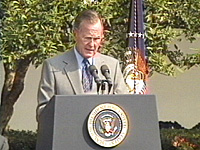
President George H.W. Bush |
The men and women we honor exemplify not simply the life of the mind, but the spirit of adventure and risk that accompanies the quest for
advancement. In honoring each of you, this nation honors a boundless horizon of the human mind, the soaring spirit of inquiry, the
special genius of the architects, who fashioned today's fantastic ideas into tomorrow's usable tool.
Announcer: John Cocke, for his development and implementation of reduced instruction set and computer architecture, that significantly
increased the speed and efficiency of computers, thereby enhancing U.S. technological competitiveness.
|
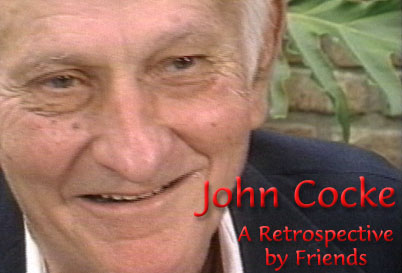




 Copyright © 2007, Mary S. Van Deusen
Copyright © 2007, Mary S. Van Deusen